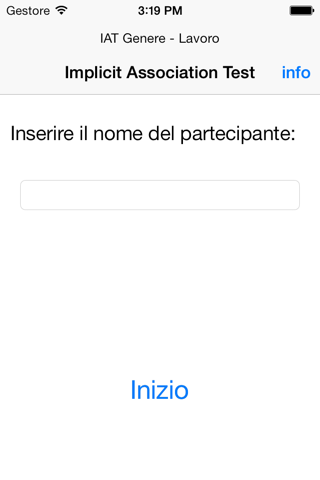
Implicit Association Test app for iPhone and iPad
Developer: Simone Sacchi
First release : 11 Dec 2013
App size: 1.2 Mb
The Implicit Association Test (IAT) is a procedure that detects automatic and unconscious associations between ideas, concepts and categories, providing a measure of how beliefs, attitudes and stereotypes may be more or less strong and deep-rooted.
In this case, the Gender-Career IAT often reveals a relative link between family and females and between career and males.
How it works:
are presented a set of words to classify into groups, as quickly as possible, making as few mistakes as possible. The interaction with the screen can be done through 2 virtual buttons at the bottom of the screen.
At the end of the test (which takes about 5 minutes), will provide a brief interpretation of the results obtained based on the response times recorded by the software. In this regard, the developer wants to clarify that this interpretation is a hypothesis and has no claim to absolute validity.
For further information please visit the Project Implicit website:
https://implicit.harvard.edu/implicit/
In particular, to develop this app the articles most used were:
B. A., Banaji, M. R., & Greenwald, A. G. (2002). Harvesting implicit group attitudes and beliefs from a demonstration website. Group Dynamics, 6(1), 101-115.
Greenwald, A. G., Nosek, B. A., & Banaji, M. R. (2003). Understanding and Using the Implicit Association Test: I. An Improved Scoring Algorithm. Journal of Personality and Social Psychology, 85, 197-216.
Lane, K. A., Banaji, M. R., Nosek, B. A., Greenwald, A. G. (2007). Understanding and using the Implicit Association Test: IV. What we know (so far) (pp. 59-102). In B. Wittenbrink N. S. Schwarz (Eds.). Implicit measures of attitudes: Procedures and controversies. New York: Guilford Press.
Nosek, B. A., Greenwald, A. G., & Banaji, M. R. (2007). The Implicit Association Test at age 7: A methodological and conceptual review (pp. 265-292). In J. A. Bargh (Ed.), Automatic processes in social thinking and behavior. Psychology Press.
If you find bugs, you want send same suggestions, ask further information or request custom apps, feel free to contact the developer: [email protected]



